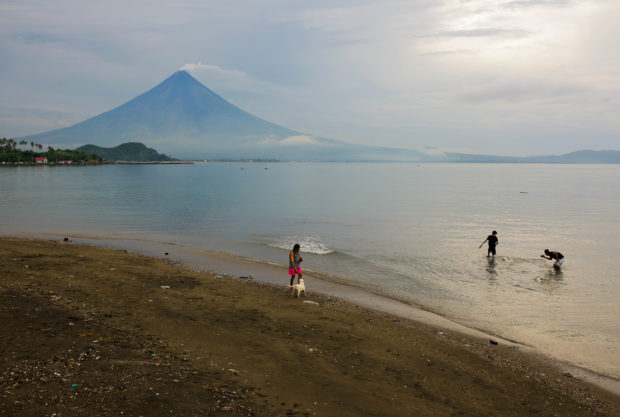Mayon soil hosts bacteria with potential anticancer properties – UPLB researchers

MORE THANMAJESTIC The slopes of Mayon Volcano, seen from the shores of Legazpi City in Albay province on Wednesday, host bacteria that potentially has antibiotics and anticancer properties, according to researchers from the University of the Philippines Los Baños. —MARK ALVIC ESPLANA
Famous for its classic symmetrical cone shape that has been drawing tourists to the Bicol region, Mayon Volcano will now also be recognized to host bacteria that exhibited potential antibiotic and anticancer properties, according to a group of researchers from the University of the Philippines Los Baños (UPLB).
The bacterial isolate, classified as Streptomyces sp. A1-08, is one of the 30 bacteria extracted recently from the soil samples of the volcano in Albay province. The Department of Science and Technology said the researchers are looking to name it Streptomyces mayonensis A1-08 once they have confirmed that it is a new species.
Kristel Mae Oliveros, project leader and assistant professor at the microbiology department of UPLB, described their findings as a “jackpot” but underscored the need to conduct more research for the Streptomyces sp. A1-08, which has pathogenic microorganisms and anticolorectal cancer potential.
“We have high hopes of getting new and novel species because this is a less explored environment, a volcano. We were totally surprised and excited,” she said on Wednesday.
The assumption of the UPLB research team was that the 30 isolates could possibly produce chemical compounds that can serve medical, pharmaceutical and cosmeceutical purposes since they thrive in a unique environment, such as Mayon Volcano.
Genomic analysis
The group discovered that Streptomyces sp. A1-08 emerged due to its antagonistic impact on microorganisms and methicillin-resistant Staphylococcus aureus (MRSA), a strong antibiotic resistant that leads to difficult infection treatment.
The finding led Oliveros and the team to further examine the bacteria through an anticolorectal cancer test that can determine whether the extracts have low potency as compared to a certain chemotherapy drug.
Streptomyces sp. A1-08 will also undergo genomic analysis, or testing of the organism’s DNAs, to identify its specific genes that are producing the antibiotic and anticancer properties.
Oliveros highlighted that more studies should be done to establish that the new species can also provide novel bioactive compounds.
“Future rigorous research in drug chemistry combined with metabolomics [is] vital to claim that the secondary metabolites produced by our isolate [are] totally new and hopefully effective as a chemotherapy drug,” she said.